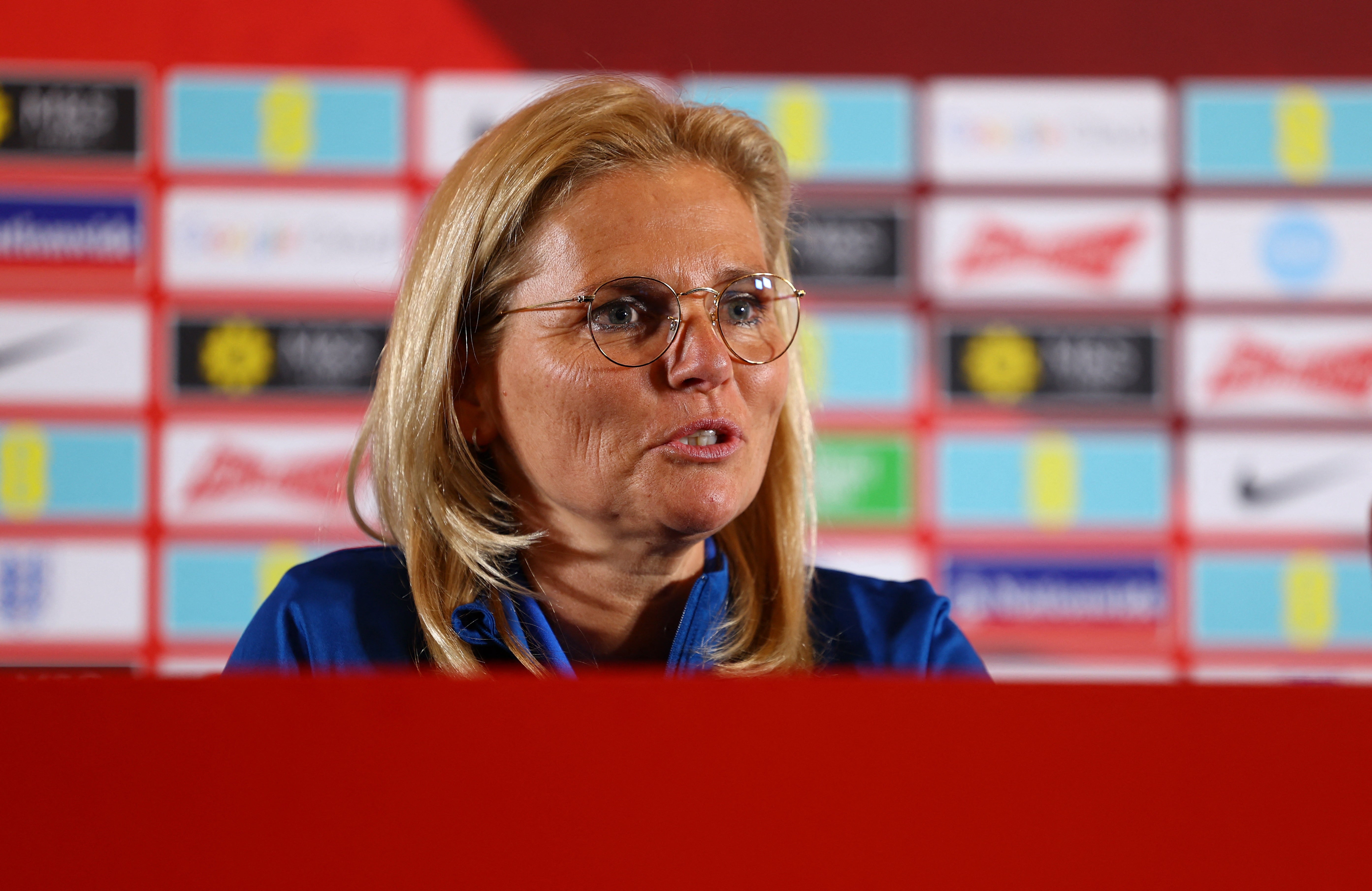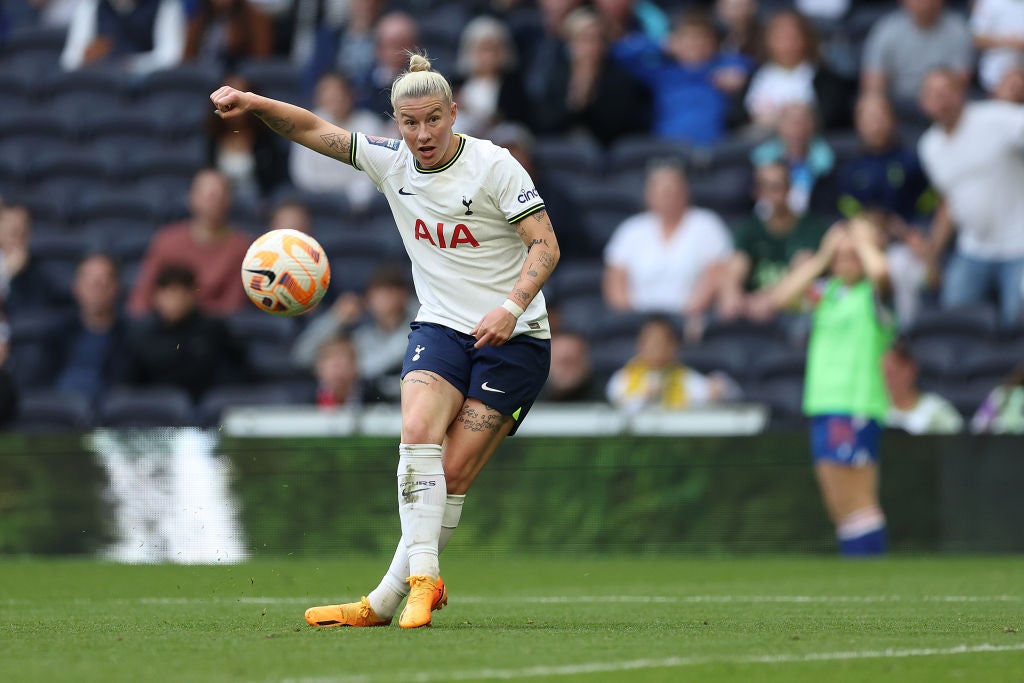Sarina Wiegman’s divisive selection reveals England’s plan to combat the unknown
The Lionesses will travel to Australia missing several key players but their squad announcement 50 days out from the World Cup was a reminder of how strong Wiegman’s side will be

Your support helps us to tell the story
From reproductive rights to climate change to Big Tech, The Independent is on the ground when the story is developing. Whether it's investigating the financials of Elon Musk's pro-Trump PAC or producing our latest documentary, 'The A Word', which shines a light on the American women fighting for reproductive rights, we know how important it is to parse out the facts from the messaging.
At such a critical moment in US history, we need reporters on the ground. Your donation allows us to keep sending journalists to speak to both sides of the story.
The Independent is trusted by Americans across the entire political spectrum. And unlike many other quality news outlets, we choose not to lock Americans out of our reporting and analysis with paywalls. We believe quality journalism should be available to everyone, paid for by those who can afford it.
Your support makes all the difference.While England’s World Cup squad was largely as expected, Sarina Wiegman saved room for a rare decision that seemed to go against the public opinion. It wasn’t the absence of Beth Mead, who simply ran out of time to recover for the World Cup, or the recall of Bethany England, who left Wiegman with no other choice after her goalscoring form since joining Tottenham. The inclusion of Millie Bright and Lucy Bronze, despite recent injury concerns, was welcomed: the Lionesses will need their experience in Australia, especially after losing Leah Williamson.
Instead, the divisive selection call was over a player with just two England caps to her name. At 21, Maya Le Tissier would have perhaps set her sights on making a World Cup stand-by list just a few months ago, but after her excellent season with Manchester United there was disbelief when Wiegman’s squad was announced and she was not among the seven defenders included.
“We had to make some hard decisions,” Wiegman explained, and Le Tissier appeared to be the toughest. She has made Wiegman’s previous two squads, for February’s Arnold Clark Cup and for April’s matches against Brazil and Australia, and impressed for United as they reached the FA Cup final and pushed Chelsea all the way in the Women’s Super League title race. Le Tissier shares some abilities with Williamson as a ball-playing centre-back, but there was also a key difference in Wiegman’s eyes.
The Lionesses manager explained that she viewed Le Tissier as a right-back, rather than in the centre-back position where she plays for United. Wiegman values versatility in her defenders, which is perhaps a reason why she only named seven in her 23-player squad. Alex Greenwood, Jess Carter and Esme Morgan cover both positions, Niamh Charles plays either side at full-back, and with Bright and Bronze fit, Lotte Wubben-Moy was picked as centre-back cover. Le Tissier, who will still travel with the squad to Australia on the stand-by list, was cut adrift.
Wiegman is a coach who rarely changes her mind once it has been set, but there is a chance her plans were altered over the past few weeks. After scoring 12 goals in as many Women’s Super League appearances since departing Chelsea for Tottenham in January, striker England has been rewarded for her resilience and drive with a place in the squad. It would have been hard to leave England out after she helped keep Tottenham up, and her inclusion means the Lionesses have as many forwards in their squad as defenders - an unusual balance for a World Cup squad.
For England, her decision to leave champions Chelsea and a routine of winning trophies under Emma Hayes in order to plunge into a relegation battle with Tottenham has been vindicated. It gave England more minutes and Wiegman more of a chance to assess her, and offered an indication of her character as well. Similarly, Jordan Nobbs was rewarded after departing Arsenal for Aston Villa in January in search of more game time. Those who took bold risks to boost their chances of the World Cup have seen them pay off.

Selecting Mead was a risk Wiegman didn’t want to take, however. “We wanted to be smart and not to be naive,” Wiegman said, and the decision to leave Mead out and give the Arsenal forward time to recover from her anterior cruciate ligament injury without the pressure of returning for a World Cup was a simple one for the England manager. Mead, Wiegman said, recognised that too.
The level of England’s remaining attacking options will still be among the best at the World Cup, and the announcement of the Lionesses squad 50 days out from the tournament was a reminder of how strong Wiegman’s side will be when they arrive in Australia on July 5. There are selection headaches all across the front line, with Lauren James, Lauren Hemp and Chloe Kelly competing for two places on the wings, and Rachel Daly and Alessia Russo to choose from up front. After scoring 22 goals for Aston Villa to win the Women’s Super League golden boot and player of the season awards, Daly is leading that race ahead of camp.
Even without Fran Kirby, the starting midfield options are impressive and look settled, with Keira Walsh, Georgia Stanway and Ella Toone among the first names on Wiegman’s list. Mary Earps will go into the World Cup as one of the best goalkeepers at the tournament. There are no problems there, and it is instead in defence where there is the only slight concern, given the loss of Williamson and Bright’s fitness. Le Tissier may not even have been a solution to that at a World Cup, and the reaction to her omission perhaps said more about the quality of her domestic season.
But despite the strength of most of Wiegman’s options, the Lionesses will still travel to Australia with a sense of the unknown. Overall, England’s squad is less experienced and has made far less international appearances than the group that won the Euros a year ago. Much of that is owed to the retirements of Jill Scott and Ellen White and being without Mead, Williamson or Kirby, while Bronze, Bright and Nobbs are the only players who remain from the last World Cup squad in 2019. Much has changed in four years, and now Wiegman is one step closer to finding out if England’s new 23 are ready.



Join our commenting forum
Join thought-provoking conversations, follow other Independent readers and see their replies
Comments